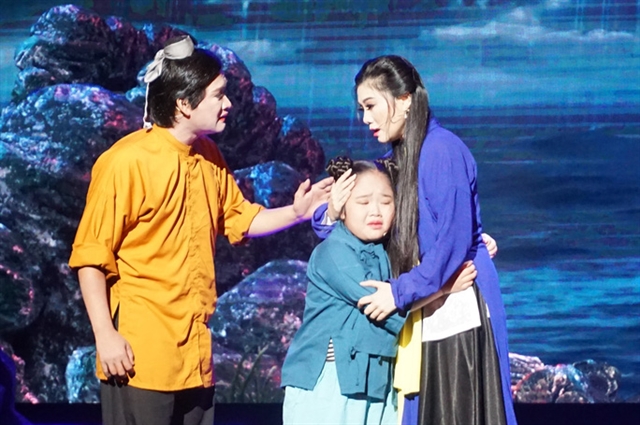[ad_1]

HCM CITY — HCM City’s Trần Hữu Trang Theatre in co-operation with its partner, the city’s Department of Culture, Sports and Tourism, will launch two projects offering cải lương shows in the city and neighbouring provinces next month.
The event’s first project will offer a series of famous plays written by Trần Hữu Trang and Viễn Châu, two of the region’s foremost artists of cải lương (reformed theatre).
One of the highlighted plays is Đời Cô Lựu (Mrs Lựu’s Life), a production by Trang first staged in the 1930s by cải lương pioneers Năm Châu, Phùng Há and Út Trà Ôn.
The play portrays Lựu, a Vietnamese woman, and her challenges and sufferings under the feudal society in the south.
Its new version is expected to attract dozens of young artists of the theatre, such as Võ Minh Lâm and Lê Tứ.
Its second project will introduce talk shows about the life and career of Trang and Châu.
“We began to hire staff and investment for the two projects last year. Our artists are working to perfect their performance and their first show is expected to open on April 1,” said Phan Quốc Kiệt, director of the Trần Hữu Trang Theatre, the region’s leading cải lương theatre, which was named for artist Trang.
“Playwrights Trang and Châu were the pioneers to feature women as leading characters in cải lương. Though they have passed away, their plays are still alive among Vietnamese audiences, particularly southerners,” said Kiệt.
Trang was born in 1906 to a farming family in Chợ Gạo in Mỹ Tho Province (now Tiền Giang).
He began his professional career in 1928, working for leading troupes in the south. In the 1930s, Trang was at the peak of his artistry and fame, trying to put his new ideas in serious plays such Lan Và Điệp (Love Story of Lan and Điệp) and Tìm Hạnh Phúc (Seeking Happiness).
After the August Revolution in 1945, Trang joined the revolution and worked in Sài Gòn-Chợ Lớn. He was a member of the National Front for the Liberation of the South.
He created more than 30 works and all feature Vietnamese characteristics. Most of them have been recognised as canonical cải lương and have been staged many times by different generations at home and abroad.
He died in 1966 in battle. His body has never been found. For his contributions, he was awarded the Hồ Chí Minh Prize by the Government in 1996.
Late People’s Artist Châu, real name Huỳnh Trí Ba, was born in 1924 in Trà Vinh Province in the Cửu Long (Mekong) Delta River Region. He was hailed as the “King of vọng cổ (nostalgia) songs”.
He wrote 2,000 vọng cổ songs and more than 70 cải lương scripts. He played the zither, violin and guitar.
In 2014 he was awarded the Labour Order, third class, for his contributions to the development of tài tử music, a traditional genre of southern theatre.
Many of his vọng cổ songs are familiar to generations of Vietnamese.
He also taught many cải lương artists, including People’s Artists Ngọc Giàu and Bạch Tuyết.
He died of natural causes at his home in 2016 in HCM City. — VNS
[ad_2]
Source link
